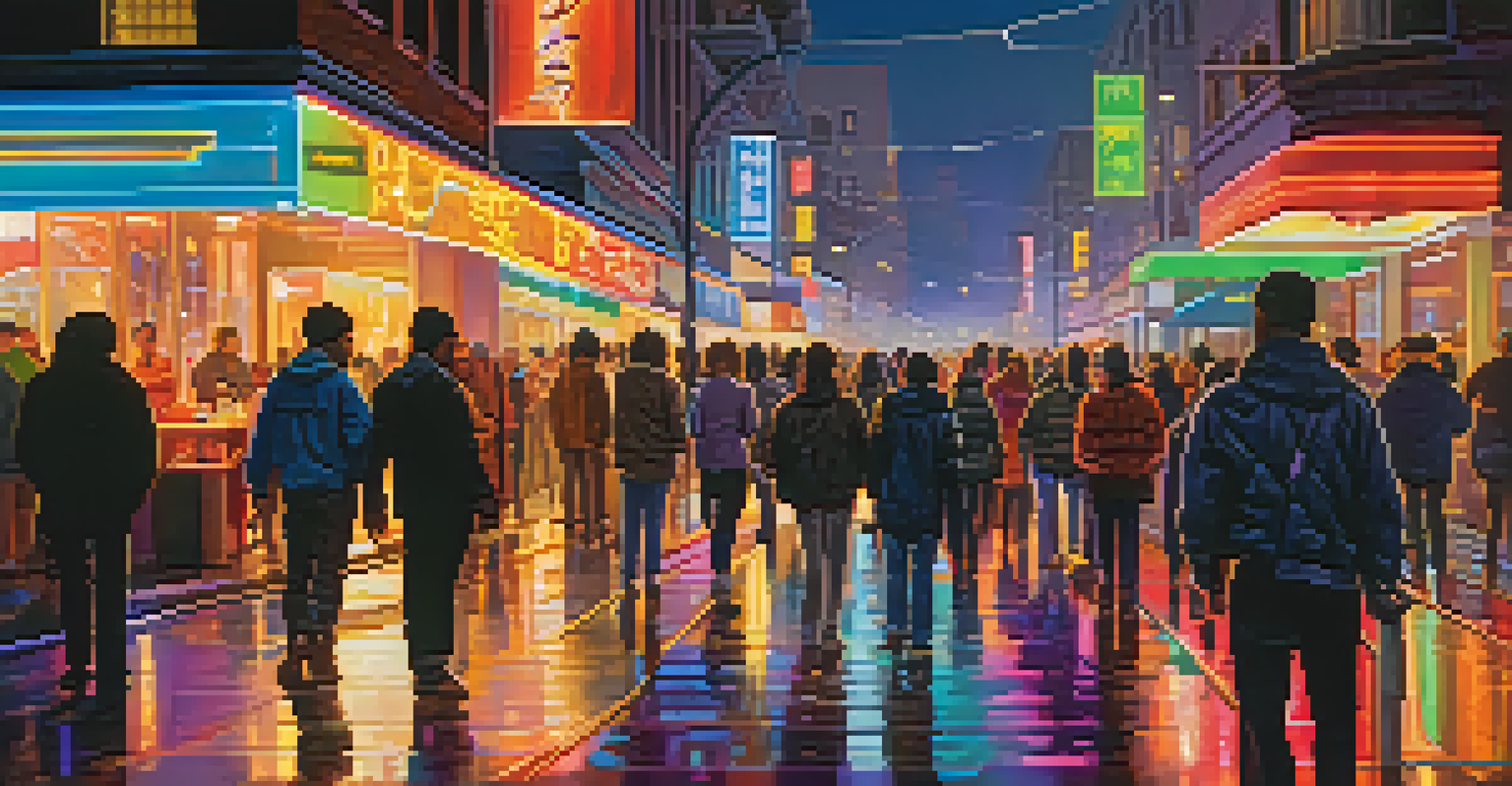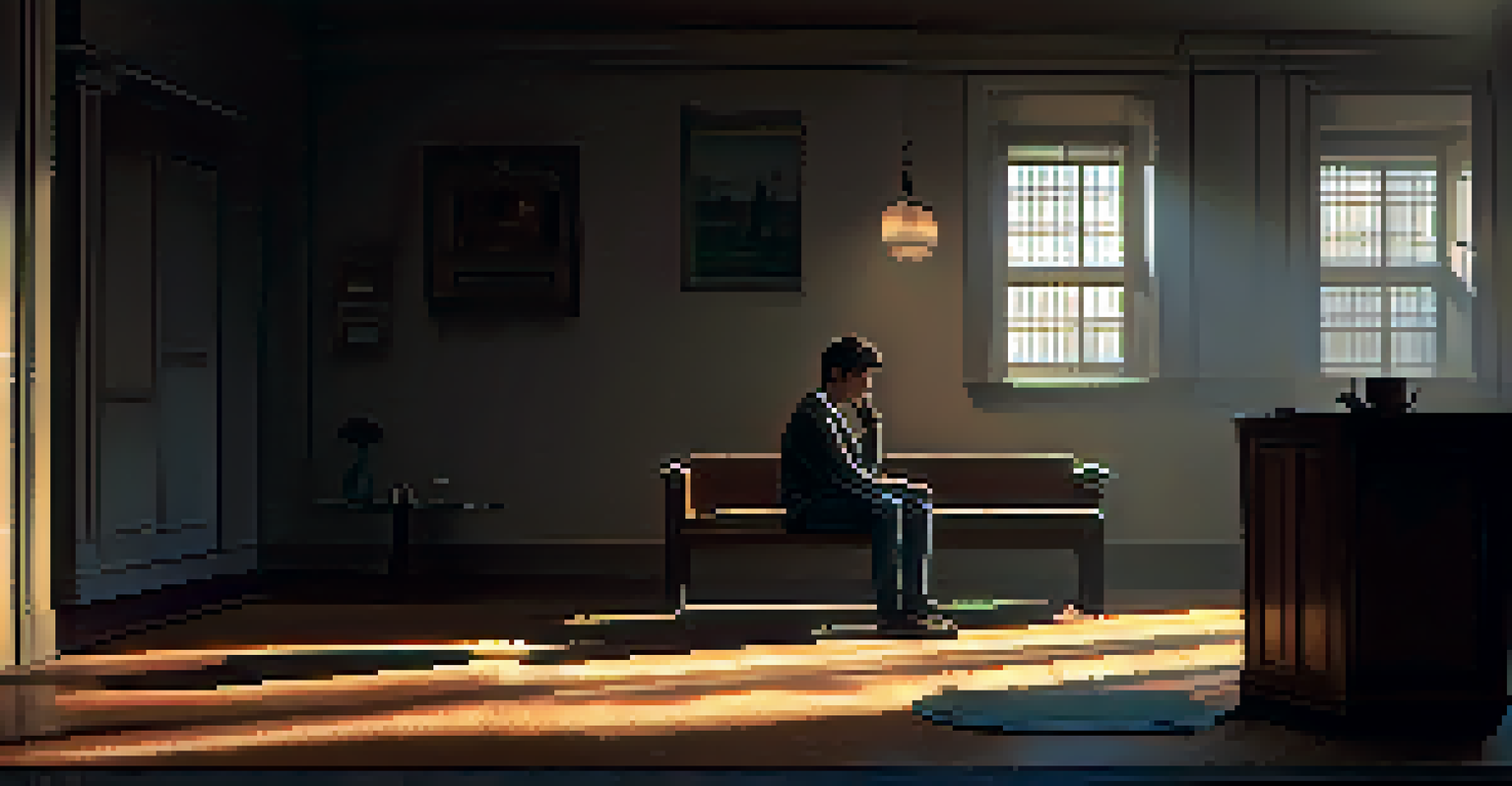The Role of Music in Setting the Tone of a Film or Series

Understanding the Emotional Power of Music in Film
Music has an unparalleled ability to evoke emotions. Imagine watching a tense scene in a thriller without the heartbeat-like pulse of a score; it simply wouldn’t feel the same. The right music can turn a simple moment into a gripping experience, heightening suspense or amplifying joy.
Music can change the world because it can change people.
Filmmakers often choose specific genres of music to underline the emotional tone they wish to convey. For example, a gentle piano piece can create an atmosphere of nostalgia, while a fast-paced rock track might energize a pivotal action scene. This careful selection plays a crucial role in storytelling.
By tapping into our emotions, music helps viewers connect with characters and their journeys. When we hear a character’s theme, it can evoke empathy or even nostalgia, making the experience more immersive and memorable.
Setting the Scene: Music as a Narrative Tool
Music does more than just accompany visuals; it tells its own story. Think of a romantic film where the music swells during a first kiss. This not only enhances the moment but also signifies a shift in the narrative, marking a key emotional turning point.

Moreover, soundtracks often provide context that visuals alone cannot convey. A haunting melody can suggest a character's internal struggle, guiding the audience's emotional response to the plot. This layer of storytelling enriches the viewer's understanding.
Music Evokes Strong Emotions
Music has a unique ability to enhance emotional experiences in film, making moments more gripping and memorable.
Directors and composers collaborate to ensure that every note aligns with the on-screen action. This partnership is essential in crafting a cohesive narrative, where music becomes an integral part of the storytelling process rather than just an afterthought.
Creating Atmosphere: The Role of Soundtracks
Soundtracks play a vital role in establishing the atmosphere of a film or series. A bustling city scene might be paired with lively music to evoke energy and excitement, while a quiet forest could be enhanced by soft, ambient sounds to create a sense of peace.
Without music, life would be a mistake.
This atmospheric music not only sets the mood but also guides the audience’s expectations. For instance, ominous tones can foreshadow upcoming danger, while uplifting melodies might signal moments of triumph or hope. This creates a rhythm that keeps viewers engaged.
Ultimately, a well-crafted soundtrack helps to immerse the audience in the world of the film or series. It draws them in, enhancing their overall viewing experience by making the setting feel more authentic and alive.
Character Themes: Building Connection Through Music
Character themes are a powerful way to deepen the audience's connection to a story. When a particular melody is associated with a character, it becomes their musical signature, evoking their personality and emotions each time it is played.
For example, the iconic theme from 'Star Wars' instantly brings to mind the heroism of Luke Skywalker. This connection allows viewers to experience the character's journey on a deeper level, fostering a sense of attachment and investment in their outcomes.
Silence Amplifies Narrative Impact
Strategic use of silence in film can create tension and deepen emotional connections, allowing audiences to fully absorb pivotal moments.
These themes can evolve throughout the narrative, reflecting a character's growth or struggles. Just as characters develop, their associated music can change, providing a rich, auditory layer to their development that resonates with the audience.
The Use of Silence: Enhancing Impact with Quiet Moments
While music is often the star of the show, silence can be just as powerful. Strategic moments of silence can create tension, allowing the audience to absorb what has just happened and anticipate what’s to come. It’s a tool that, when used effectively, can amplify emotional impact.
Think about a scene where a character receives devastating news. The absence of music can heighten the weight of the moment, letting the gravity of the situation sink in. This contrast between music and silence is crucial in crafting a compelling narrative.
Silence also encourages viewers to reflect on the emotional landscape of a scene. By creating space for thought, filmmakers can deepen the audience's connection to the story, making the subsequent musical cues even more resonant.
Cultural Context: Music Reflecting Societal Themes
Music in film often reflects cultural themes and societal issues, acting as a mirror to the world we live in. For instance, a film set in the 1960s might incorporate folk music to evoke a sense of rebellion and change, resonating with the historical context.
By choosing specific musical styles or songs, filmmakers can reinforce the themes of their narratives. This cultural resonance can make the story more relatable and impactful, connecting viewers to the broader societal conversations happening around them.
Cultural Context Shapes Soundtracks
Music in film often reflects societal themes and cultural issues, enriching narratives and connecting viewers to broader conversations.
In this way, music becomes a vehicle for commentary, allowing filmmakers to express their perspectives on issues that matter. Whether it’s through a nostalgic tune or a contemporary hit, music can illuminate the film’s message, enriching the viewer’s experience.
The Evolution of Film Scores: From Classical to Contemporary
The evolution of film scores reflects changes in both technology and audience preferences. In the early days of cinema, live orchestras accompanied films, creating a unique atmosphere that set the tone for the viewing experience. Today, technology allows for a diverse range of musical styles.
Modern scores often blend orchestral music with electronic elements, providing filmmakers with an expansive toolkit for emotional storytelling. This fusion allows for innovative soundscapes that can adapt to various genres, from horror to romance.

As tastes evolve, so does the approach to scoring films. Contemporary composers may draw inspiration from different genres, resulting in soundtracks that resonate with diverse audiences, ensuring that music continues to play a pivotal role in the cinematic experience.